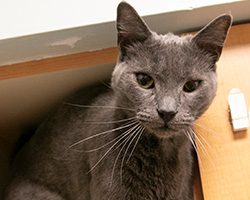ARL Alum Found Living Among Cat Colony
Cat from cat colony receives critical surgery upon return to ARL
When a three-year-old cat was recently trapped from a cat colony in Boston, the organization scanned the animal for a microchip, and turns out the cat was adopted from the Animal Rescue League of Boston (ARL) when he was just a kitten.
The male cat, now named Snapple, had been seen around the colony for about a year, so it’s likely he was abandoned at some point in his young life and showing off his survival skills, found and integrated with the colony to be with other outdoor cats.
When he was identified as an ARL alum, he was transported to ARL’s Dedham Animal Care and Adoption Center where he received a thorough veterinary exam, and while he was slightly underweight, the more pressing issue was entropion – a condition where the upper or lower eyelid is inverted and if left untreated can cause corneal abrasions, severe pain, and in some cases eventual blindness.
Both of Snapple’s lower eyelids were inverted, and ARL’s shelter medicine team performed a surgical procedure to correct the issue, saving the cat a life of pain and possible blindness.
Going Home
With the surgery completed and having a few days to recover, the next step for Snapple was to find the permanent and loving home he deserved.
Despite spending an unknown amount of time on his own in the outdoors, Snapple showed to be an incredibly social cat, often leaping into the arms of anyone interacting with him in his kennel.
To no ones surprise, when Snapple was made available for adoption, he quickly found his new home and has already settled in and is thriving with his new family!
About ARL’s Community Cat Program
Community cats face many challenges living outdoors.
Without proper shelter and care, they are at risk of illness and injury.
Additionally, without spay/neuter surgery, these cats can produce many litters and continue the cycle of large colonies of unowned cats.
As part of ARL’s Community Cat Program, the organization’s Field Services agents will respond to the call of residents who report a colony of cats, investigating the colony to determine the number of cats and kittens residing in that area, the cats’ overall health status, and whether or not a local resident is feeding them regularly and can continue.
After the initial assessment, a TNR (Trap-Neuter- Return) plan is formulated for that particular colony.
TNR is one of the most humane and effective ways to stop the cycle of homelessness among cats.
Spay and neuter surgeries are low risk and proven to improve the safety and health of these cats as well as the community as a whole.
The plan also includes vaccines, and whether each cat will be returned to the colony, returned to their owner if microchipped, or admitted to an ARL shelter to be put up for adoption if they are friendly.


